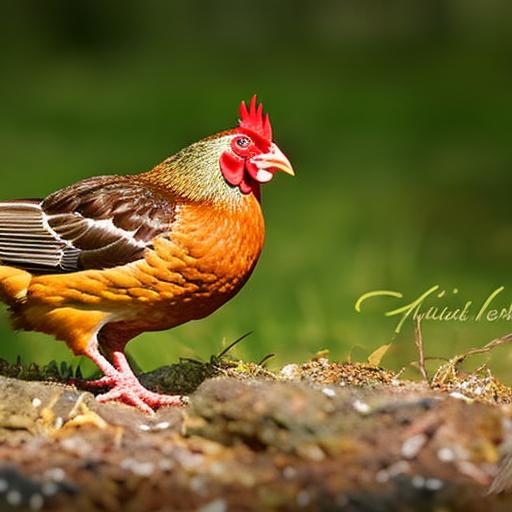Keeping chickens on a 1-acre property can be a rewarding and fulfilling experience. Not only do chickens provide fresh eggs, but they also offer pest control, fertilizer for your garden, and entertainment with their quirky personalities. I have personally kept chickens on my 1-acre property for several years and have found it to be a wonderful addition to my homestead.
One of the main benefits of keeping chickens on a 1-acre property is the ability to have a sustainable source of fresh eggs. Chickens are relatively low-maintenance animals that require minimal space and resources. With just a small investment in a chicken coop and run, you can have a constant supply of nutritious eggs for your family.
In addition to the practical benefits, keeping chickens on a 1-acre property can also be a fun and educational experience for children. They can learn about responsibility, animal care, and the cycle of life as they help care for the chickens and collect eggs. It is also a great way to teach them about sustainable living and where their food comes from.
Key Takeaways
- Keeping chickens on 1 acre of land can be a rewarding and sustainable hobby.
- Understanding the space requirements and choosing the right breeds are crucial for successful chicken keeping on 1 acre.
- Designing a suitable coop and run, and providing proper feeding and watering are important for the health and well-being of your chickens.
- Maintaining cleanliness and hygiene, and complying with legal requirements are essential for a safe and healthy environment for your chickens.
- Protecting your chickens from predators and maximizing egg production require proper care and management.
Understanding the Space Requirements for Chickens on 1 Acre
When determining how much space chickens need on a 1-acre property, there are several factors to consider. The general rule of thumb is to provide at least 4 square feet of coop space per chicken and 10 square feet of run space per chicken. However, these numbers can vary depending on the breed of chicken and the amount of time they will spend in the coop or run.
It is important to consider the size of your property when determining the space requirements for your chickens. If you have a small 1-acre property, you may need to limit the number of chickens you keep or provide additional space for them to roam outside of their coop and run.
Another factor to consider is the breed of chicken you choose. Some breeds are more active and require more space to roam, while others are more docile and can be kept in smaller areas. It is important to research different breeds and choose ones that are suitable for your 1-acre property.
Choosing the Right Chicken Breeds for Your 1 Acre Property
When choosing chicken breeds for your 1-acre property, it is important to consider several factors. First, you should consider the size of the breed. Some breeds, such as the Rhode Island Red or the Sussex, are larger and require more space to roam. If you have a small 1-acre property, you may want to choose smaller breeds, such as the Bantam or the Silkie.
Another factor to consider is the temperament of the breed. Some breeds are more docile and can be kept in smaller areas, while others are more active and require more space to roam. If you have close neighbors or limited space, you may want to choose breeds that are known for being calm and quiet.
It is also important to consider the purpose of keeping chickens on your 1-acre property. If you are primarily interested in egg production, you may want to choose breeds that are known for their high egg-laying capabilities, such as the Leghorn or the Australorp. If you are interested in meat production, you may want to choose breeds that are known for their meat quality, such as the Cornish Cross or the Jersey Giant.
Designing Your Chicken Coop and Run on 1 Acre
Designing a chicken coop and run on a 1-acre property requires careful planning and consideration. The coop should provide enough space for your chickens to roost, lay eggs, and move around comfortably. It should also be well-ventilated and provide protection from predators.
When designing your chicken coop, it is important to consider the number of chickens you plan to keep. As mentioned earlier, each chicken should have at least 4 square feet of coop space. You should also provide nesting boxes for your hens to lay their eggs and roosting bars for them to sleep on.
The run should provide enough space for your chickens to roam and forage. Each chicken should have at least 10 square feet of run space. It is also important to provide protection from predators by using sturdy fencing and covering the top of the run with wire mesh.
Feeding and Watering Your Chickens on 1 Acre
Feeding and watering your chickens on a 1-acre property is relatively simple. Chickens are omnivores and require a balanced diet of grains, protein, fruits, and vegetables. You can purchase commercial chicken feed or create your own feed mix using a combination of grains, such as corn, wheat, and barley, along with protein sources like soybean meal or fish meal.
In addition to their feed, chickens also require access to fresh water at all times. It is important to provide clean water in a container that is large enough for all of your chickens to drink from. You should also check the water regularly to ensure it is clean and free from debris.
To supplement their diet, you can also allow your chickens to forage in your yard or garden. They will eat insects, worms, grass, and weeds, which can help control pests and provide additional nutrients.
Maintaining Cleanliness and Hygiene on a 1 Acre Chicken Farm

Maintaining cleanliness and hygiene on a 1-acre chicken farm is essential for the health and well-being of your chickens. A clean coop and run will help prevent the spread of disease and parasites.
One of the most important aspects of cleanliness is regular cleaning of the coop and run. You should remove any droppings or soiled bedding on a daily basis and replace it with fresh bedding. This will help prevent the buildup of ammonia and bacteria, which can lead to respiratory problems in chickens.
It is also important to regularly clean and disinfect the water containers and feeders. This will help prevent the spread of bacteria and disease. You should also regularly inspect your chickens for signs of illness or parasites and take appropriate action if necessary.
Understanding the Legal Requirements for Keeping Chickens on 1 Acre
Before keeping chickens on a 1-acre property, it is important to understand the legal requirements in your area. Some cities or neighborhoods have restrictions on the number of chickens you can keep or require permits for keeping chickens.
You should check with your local zoning department or animal control office to determine if there are any regulations or restrictions in your area. They can provide you with information on the number of chickens allowed, setback requirements, and any other regulations you need to comply with.
It is also important to be a good neighbor when keeping chickens on a 1-acre property. This includes keeping your chickens contained within your property, minimizing noise and odor, and properly disposing of waste.
Dealing with Predators and Protecting Your Chickens on 1 Acre
Predators can pose a threat to your chickens on a 1-acre property, so it is important to take steps to protect them. Common predators include raccoons, foxes, coyotes, and birds of prey.
To protect your chickens from predators, you should ensure that your coop and run are secure. This includes using sturdy fencing that is buried at least 12 inches into the ground to prevent predators from digging under it. You should also cover the top of the run with wire mesh to prevent birds of prey from swooping down and grabbing your chickens.
It is also important to lock up your chickens in their coop at night when predators are most active. You should provide a secure door that can be closed and locked to keep predators out.
Maximizing Egg Production on 1 Acre with Proper Care and Management
To maximize egg production on a 1-acre property, it is important to provide your chickens with proper care and management. This includes providing a balanced diet, clean water, and a comfortable living environment.
You should also ensure that your chickens are healthy and free from disease or parasites. Regularly inspect your chickens for signs of illness or parasites and take appropriate action if necessary. This may include providing medication or treatment as recommended by a veterinarian.
It is also important to provide your chickens with enough light to stimulate egg production. Chickens require at least 14 hours of light per day to lay eggs consistently. If natural light is not sufficient, you can use artificial lighting to supplement their light exposure.
The Benefits and Challenges of Keeping Chickens on 1 Acre
In conclusion, keeping chickens on a 1-acre property can be a rewarding and fulfilling experience. Not only do chickens provide fresh eggs, but they also offer pest control, fertilizer for your garden, and entertainment with their quirky personalities.
While there are challenges to keeping chickens on a 1-acre property, such as space limitations and predator protection, these can be overcome with proper planning and management. By understanding the space requirements for chickens, choosing the right breeds, designing a suitable coop and run, providing proper care and nutrition, maintaining cleanliness and hygiene, complying with legal requirements, and protecting your chickens from predators, you can successfully keep chickens on your 1-acre property.
I encourage readers to consider keeping chickens on their own 1-acre property. Not only will you enjoy the benefits of fresh eggs and sustainable living, but you will also have the opportunity to connect with nature and teach valuable lessons to your children. So why not give it a try? You may find that keeping chickens on a 1-acre property is one of the best decisions you ever made.
If you’re interested in keeping chickens on your 1-acre property, you might also want to explore the fascinating world of turkey farming. Poultry Wizard has an informative article on whether turkeys need a coop, which can provide valuable insights into creating suitable housing for these birds. Understanding the specific needs and requirements of turkeys can help you make informed decisions when it comes to designing a comfortable and safe environment for your feathered friends. To learn more about turkey coops, check out this article on Poultry Wizard’s website.
FAQs
What is the minimum amount of space required to keep chickens?
According to industry standards, each chicken requires a minimum of 3-4 square feet of space in a coop and 8-10 square feet of outdoor space.
Can you keep chickens on 1 acre of land?
Yes, you can keep chickens on 1 acre of land. However, the number of chickens you can keep will depend on the zoning laws in your area and the amount of space you have available for their coop and outdoor area.
How many chickens can you keep on 1 acre of land?
The number of chickens you can keep on 1 acre of land will depend on the zoning laws in your area and the amount of space you have available for their coop and outdoor area. As a general rule, you can keep up to 12 chickens on 1 acre of land.
What are the benefits of keeping chickens on 1 acre of land?
Keeping chickens on 1 acre of land can provide a number of benefits, including a source of fresh eggs, natural pest control, and fertilizer for your garden. Additionally, chickens can be entertaining and enjoyable pets.
What are the potential drawbacks of keeping chickens on 1 acre of land?
Some potential drawbacks of keeping chickens on 1 acre of land include noise, odor, and the potential for attracting predators. Additionally, chickens require daily care and maintenance, which can be time-consuming.
What do you need to keep chickens on 1 acre of land?
To keep chickens on 1 acre of land, you will need a secure coop with nesting boxes and roosting bars, as well as an outdoor area that is fenced and provides access to food, water, and shade. You will also need to provide daily care and maintenance, including feeding, watering, and cleaning the coop.
Meet Walter, the feathered-friend fanatic of Florida! Nestled in the sunshine state, Walter struts through life with his feathered companions, clucking his way to happiness. With a coop that’s fancier than a five-star hotel, he’s the Don Juan of the chicken world. When he’s not teaching his hens to do the cha-cha, you’ll find him in a heated debate with his prized rooster, Sir Clucks-a-Lot. Walter’s poultry passion is no yolk; he’s the sunny-side-up guy you never knew you needed in your flock of friends!







